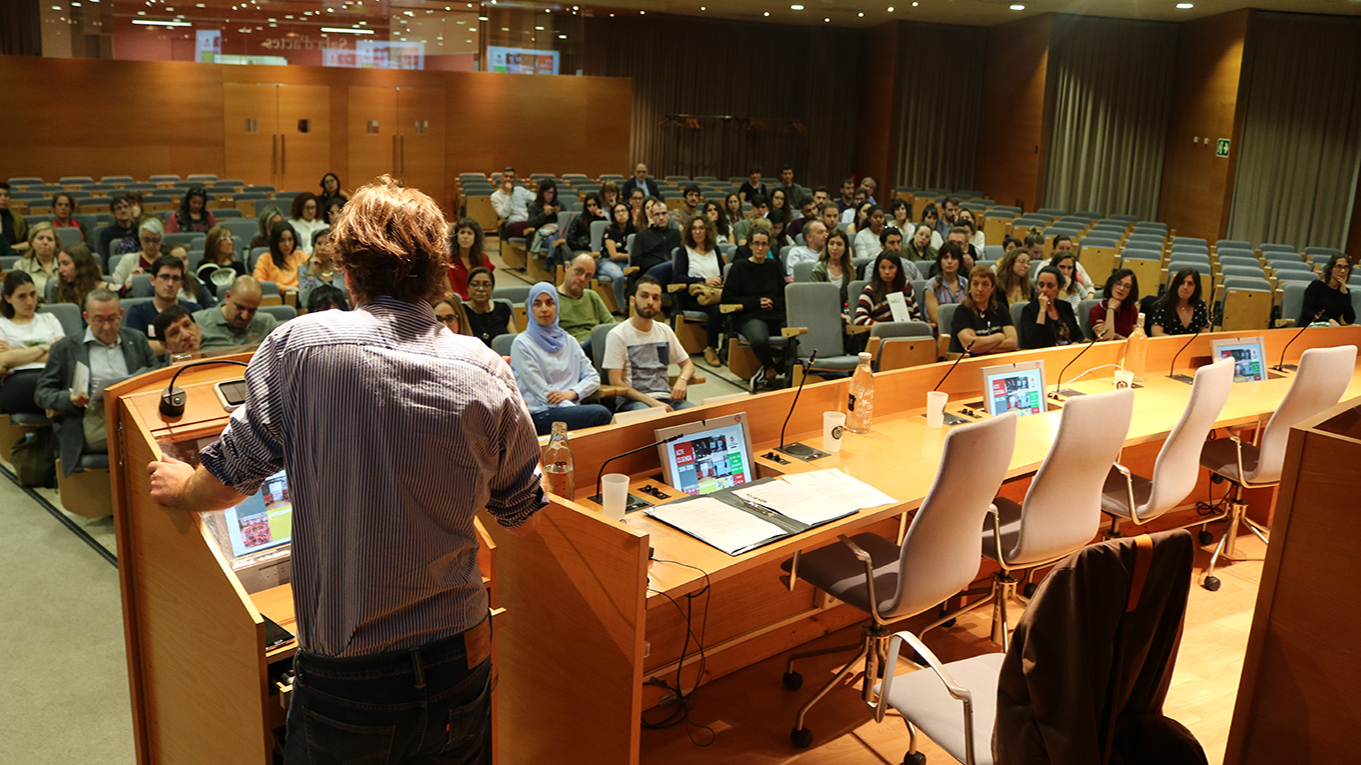A year of social action in FAS

30/05/2019
Journalist and alumni Sergi Picazo started the event stating that “the first volunteering experience for most people is during their time in university, and FAS is a good opportunity”. His first article shortly after enrolling to university was about the Prisoners’ Placement Programme, which is today FAS’ Justice Programme.
The journalist was the one to present the important data that summarize this year’s social action with a team of 410 volunteers and 2816 beneficiaries, with a total of 4893 people took part in activities within UAB. Jordi Prat, director of FAS, pointed out the news in 2018/2019: starting a new volunteering programme in Hospital de la Santa Creu i Sant Pau; the Commemoration of the International Day of Persons with Disabilities; promoting the Learning Service; or the strategic review on the Health and Environmental programmes.
Testimonies showed the work done in regards to sheltering refugees, volunteering, and support to people with disabilities and/or specific educational needs for Global Justice, health or environment. These projects convert FAS into a social entity of reference in university.
FAS president and Vice-Rector for Institutional Relations and Culture Carlos Sánchez lead the event’s closing. “In UAB we do not only train graduates – we train citizens”. The entity’s president also pointed out that “FAS has a relevant in forming critical, responsible and solidary students, acting as one of the best examples of knowledge transfer”.
#UABRefugi
This review on the year’s leitmotif was the Shelter Programme as it was the main topic to discuss in the two round tables. Two years after its creation and still on its process of consolidation, this issue was the theme of this year’s Festa Major under the slogan: #UABRefugi, Autònoma shelters.
“The UAB shelter programme saved my life – I am not going to be a refugee all my life” said Louai Almadani, beneficiary of the programme and the speaker who started the round table’s debate. Marta Arumi, professor in the Faculty of Translation and Interpreting, member of the research group MIRAS and collaborator in the programme, stated that the university’s work on the issue has raised awareness and interest on immigration, refuge and human rights: “We can confirm a significant increase of bachelor’s and master’s degree final projects on these issues”.
Khoula Benomar, volunteer for social accompanying in the Programme, went a step further. She celebrates the good practices done in the Foundation but considers that “University should raise more awareness and diffusion in order for the rest of students to know the issue better”.
497 people took part in the awareness activities about migration, asylum and refuge and 53 people benefited from the Shelter programme during this year. The programme celebrated the Week of Migrations and Human Rights for the first time. This week was meant to call for reflection and awareness to tackle these issues in a deeper and more critical manner.
Experiences that transform
The second round table “Experiences that transform” was composed of people linked to the different programmes and core ideas of FAS. Anna Vila, from the Justice programme , considers that “the magic of personal transformation that you experience when you do a volunteering is the fact that it can actually transform your surroundings”. Vila, as a volunteer, organizes public speaking activities in prisons. During this year, 392 people benefited from this programme in three penitentiary centers and five educational centers of juvenile justice.
Maria Olivé, intern and organizer of activities in the Socio-sanitary programme, “you receive more than what you give when you go to these centers and this makes you see how things are way simpler”. The socio-sanitary programme is carried out in three hospitals and works with hospitalized children and elders in a situation of dependency: 1083 persons benefited from this programme.
Eulalia Sot, psychologist in the Drug addiction General Subdirectorate, stressed on the importance of the close actions, one on one. “We know that having someone you feel close to doing the drug prevention activities usually works best, which is what the Health volunteering does”, she commented. The activities for promotion of health, the information point Xiringu being one of them, reached a total amount of 2480 people.
The last person to speak in the round table was Laura Girbau. Girbau is a teacher who is collaborating in the Socio-educative programme CROMA 2.0 with a project of social cinema. “It is very interesting to watch the personal process of children. I want to especially thank all the volunteers who made it possible”, she pointed out. The CROMA 2.0 works in primary education schools and is one of the three socio-educative programmes that FAS manages, whose beneficiaries are up to 972 people.
A video with the activities of this year and its witnesses was screened during the ceremony.